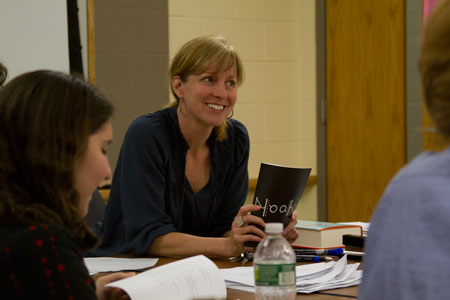The work of Ithaca College faculty members does not stop when they step outside the classroom, and a new online student magazine hopes to document professors’ most exciting endeavors. Tandem, an online magazine formed by students in a new writing course, highlights some faculty projects.

Catherine Taylor, assistant professor of writing, formed the semester-long class on editing and publishing this year to provide students with an opportunity to learn more about the publishing industry. Taylor owns a small, independent press called Essay Press, and she said she feels as though the course was a much needed addition to the writing department’s composition-intensive course selection.
“We have very few classes that focus on the professional development of the student writer,” she said. “It seemed like Editing and Publishing would be another course that made a bridge between what the writing students have been doing as undergraduates and the writing they can do in the world after graduation.”
Taylor said she gave her students the option of producing a publication of their choosing as a class project, and they jumped at the opportunity. Senior Liam Curley, a writing major, was one of five students to join a research team to determine what kind of publication the class wanted to put out.
“We started looking at publications on campus to see what was already published and if we’d be repeating, and we noticed that a lot of it was the same audience,” Curley said. “It was mostly geared toward students or potential students and was capturing that voice. But what we noticed that was absent was a teacher’s voice.”
The students decided to focus on faculty collaborations with other professors and students, whether these collaborations involve co-authoring a book, carrying out a study or helping people in another country. The next step was to choose a name that reflected the magazine’s objective, Curley said, and the word ‘tandem’ articulates the idea of collaboration.
“The way a tandem bike works is that it’s two people to make a bike work, and you use two people to get from point A to point B,” Curley said. “Also, what’s interesting is just how a bike works, how it comes together in pieces.”
Based on their strengths and areas of interest, the students divided themselves into small groups responsible for different stages of the publishing process. The submissions team is responsible for gathering content for the magazine, the layout team designs the website, and the editorial team interviews professors and helps organize the submission team’s content into a feature. Some stories have already reached the copy editing team, which is responsible for semantics, syntax and the overall style of the features.
While Tandem has become the capstone requirement of the course, the class has also been divided to work on smaller publications, such as Noah, a cross-genre literary magazine; Disbanned, which works to bring attention to banned books; Threads, which produces hand-bound works of fiction and poetry; and WYTX Radio, a blog with no specific content focus.
Prior to these hands-on projects, students in the class toured publishing houses in New York City, ranging from big names like Penguin to smaller presses like Ugly Duckling. Junior Ben Shipley, Tandem’s managing editor, said it was exciting to learn the jargon of the industry to apply to its own publications.
“In the world of publishing, based on the size of your house, you could be doing 5,000 things at once, or you could be doing one thing,” Shipley said. “Talking with people in the business, it’s really great to see how much our process mirrors theirs.”
Though Tandem is a class assignment, Curley said, the students working on the project hope to continue it after the end of the semester. Shipley said he wants to incorporate more multicultural experiences in the future.
“Right now we’re self-contained within the IC campus,” Shipley said. “That’s what we have access to, but we definitely see this working across the country, or even across the world because our professors have contacts of who they’re working with elsewhere.”
Shipley said the students feel as though they have accomplished something substantial and have effectively filled a void in the college’s student media.
“It started with two words on a white board, and it became Tandem,” Shipley said, “It’s great being able to use empty space and fill it with our own ideas.”
To read the students’ work, visit tandemmagazine.net.








